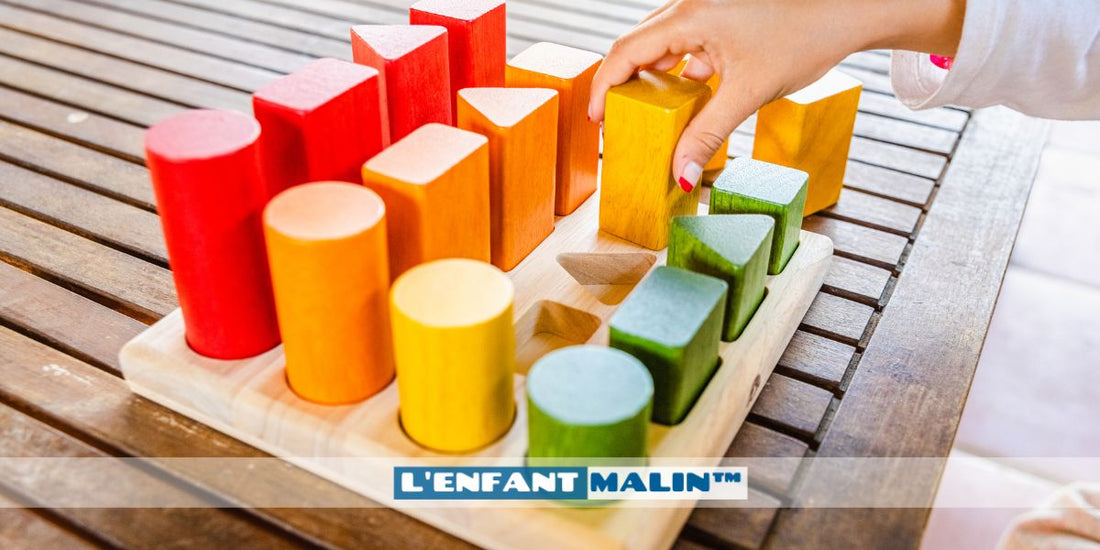Introduction to the Montessori Method and Wooden Puzzles
Presentation of Montessori pedagogy
The Montessori method is a child-centered educational pedagogy, where learning is guided by each child's natural curiosity and creativity. This approach respects sensitive periods of child development, encouraging the awakening of their senses and the development of their motor and cognitive skills. Montessori pedagogy is distinguished by its specific educational materials, designed to support independent learning and stimulate observation, grasping, coordination and other aspects of the child's development.
Wooden puzzles in Montessori education
Wooden puzzles are a great example of Montessori toys that promote learning through play. These puzzles are designed to develop fine motor skills, observation and coordination in young children. They are also very effective at sparking curiosity and promoting understanding of concepts such as shapes, colors, numbers and letters. Wooden puzzles are often made up of pieces of different shapes and sizes, which must be put together to create a picture or pattern. This process requires the child to demonstrate patience, concentration and problem solving, essential skills in everyday life.
Cognitive and Emotional Benefits of the Montessori Wooden Puzzle
The wooden Montessori puzzle stands out as a educational toy of first choice to stimulate awareness and learning in young children. Indeed, this Montessori material responds perfectly to the sensitive periods of early childhood, periods during which toddlers are extremely receptive to certain learning. Thus, the Montessori puzzle contributes to the refinement of motor skills and observation in each child.
Stimulation of cognitive development with Montessori puzzles
The wooden Montessori puzzle is a fun tool that promotes the child's cognitive development. Thanks to it, your child can develop his fine motor skills, his coordination and his grip. It is also an excellent way for young children to learn to read and introduce themselves to mathematics. Indeed, each Montessori toy aims to make learning fun and interesting for children. Thus, by playing with puzzles, your child must exercise his sense of observation and logic, therefore strengthening his cognitive abilities.
Building self-confidence and patience through puzzles
In addition to the cognitive benefits, the Montessori wooden puzzle also has emotional benefits. Indeed, this educational toy helps to strengthen the child's self-confidence and patience. By successfully putting the pieces of the puzzle together, they experience a feeling of accomplishment which boosts their self-confidence. In addition, since assembling the pieces requires concentration, your child also learns to be patient. Thus, the Montessori puzzle contributes to the emotional development of your child.
Physical and Sensory Benefits of the Montessori Wooden Puzzle
The Montessori wooden puzzle is more than just a toy. It is an educational tool designed to promote your child's development in several areas, including fine motor skills, sensory and cognitive awareness.
Development of fine motor skills with wooden puzzles
One of the main advantages of the Montessori wooden puzzle is its contribution to the development of your child's fine motor skills. In fact, each child must manipulate and fit together the different pieces of the puzzle, which requires and strengthens their motor skills. In addition, this fun activity promotes hand-eye coordination, grip and precision of gestures. Thus, Montessori wooden puzzles actively participate in learning and mastering the fine and precise movements necessary in daily life.
Stimulation of the senses through the use of wood
The choice of wood for Montessori puzzles is not trivial. This natural material provides a rich sensory experience for young children. The touch of wood, its smell, the perception of its warmth and its texture, the observation of the different shades of color and the veins of the wood awaken your child's senses, thus stimulating their curiosity and their desire to explore. Furthermore, wood offers specific resistance and weight which allow the child to develop their sense of balance and their perception of space. Thus, Montessori wooden puzzles are not only fun but also educational, offering a holistic approach to learning.
Choosing a Montessori Wooden Puzzle: Criteria and Recommendations
A wooden Montessori puzzle is an educational toy that contributes to the child's awareness and development. This type of toy, based on Montessori pedagogy, helps each child develop their motor skills, coordination, curiosity and creativity. It is fun and playful, offering a unique sensory approach to learning. When choosing the appropriate puzzle, it is essential to consider your child's age, interests and grasping abilities.
How to choose the right Montessori puzzle based on the child's age?
For toddlers, simple puzzles with large pieces or cubes are recommended to make it easier to grasp. As the child grows, it is possible to introduce more complex puzzles to stimulate their observation and fine motor skills. The Montessori method encourages learning through observation, and an age-appropriate puzzle should support this aspect of pedagogy.
Recommendations for effectively using Montessori wooden puzzles
To use Montessori wooden puzzles effectively, the adult must accompany the child in their exploration. Puzzles should be presented in an attractive and accessible way to encourage the child to play. It is also important to respect the pace of each child, giving them time to discover and experiment at their own pace. Wooden Montessori puzzles are valuable learning tools that, when used correctly, can stimulate a child's awareness and cognitive development.
